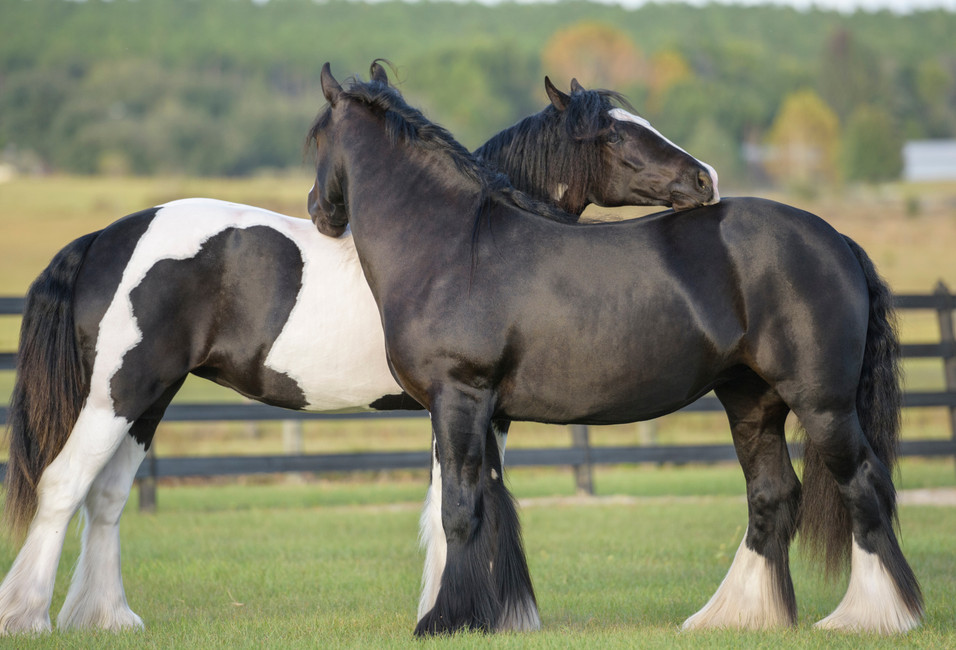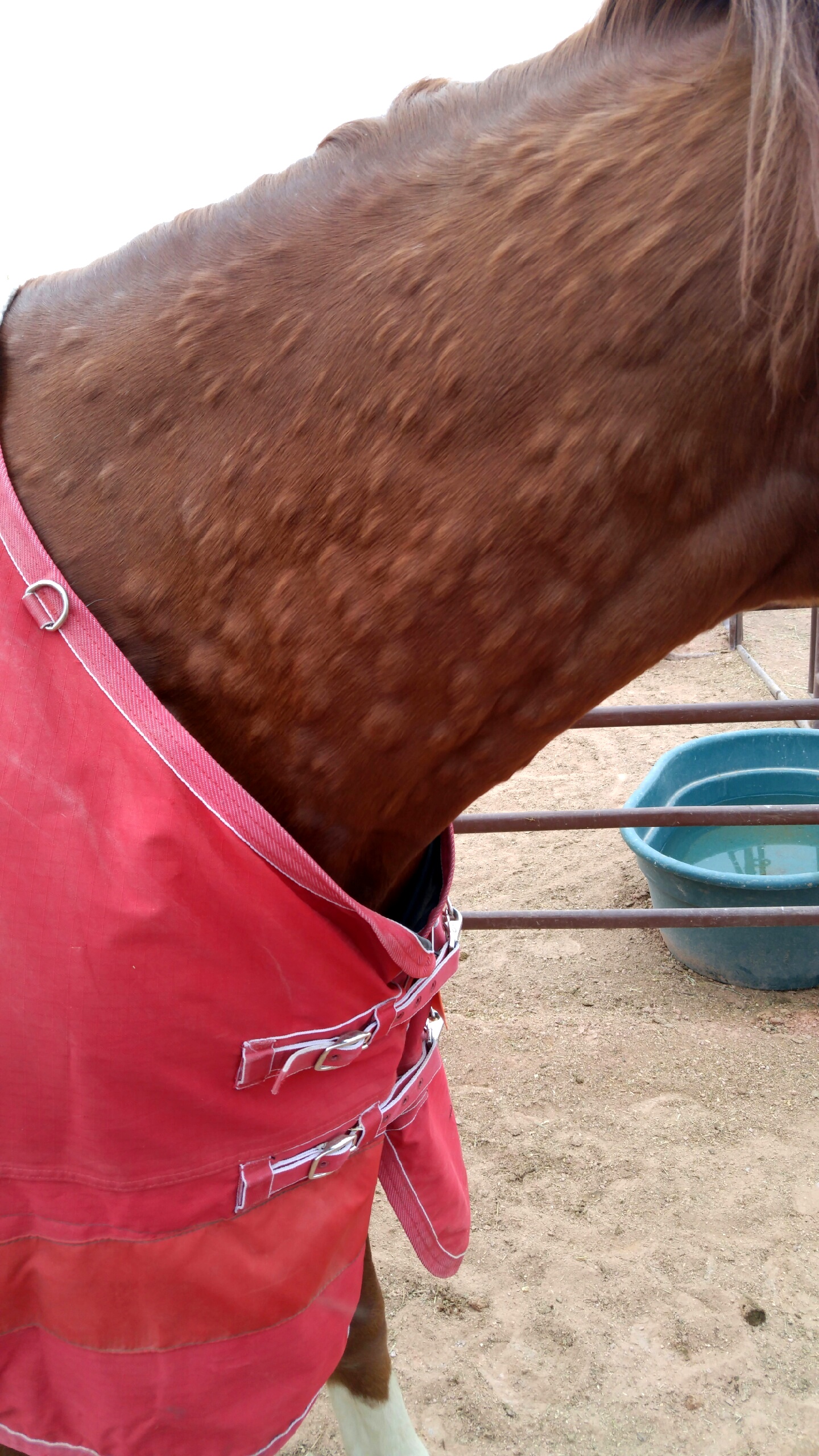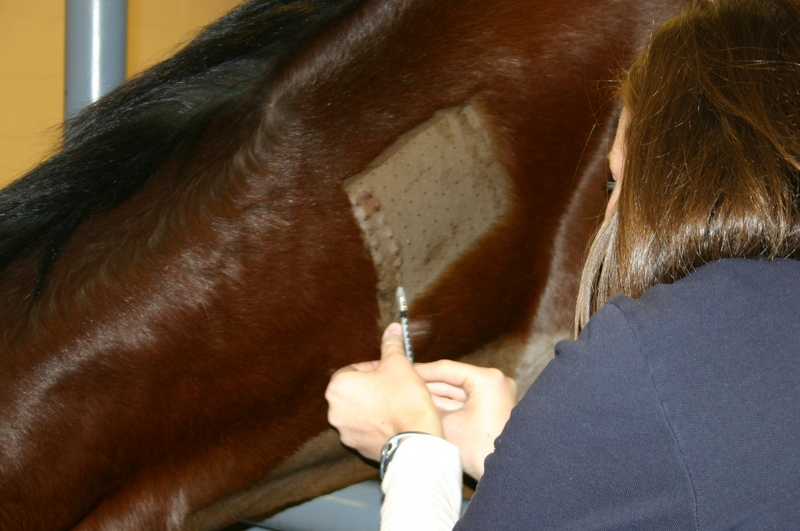
Seasonal Allergies: How do they affect my horse?
Just as discussed in last week's post, seasonal allergies can not only affect you, but your animals, too. Horses can struggle in many ways with seasonal allergies but the most commonly affected areas are the skin and respiratory systems.
 Two of our previous blogs took you through a few particularly tough cases which I invite you to revisit:
Two of our previous blogs took you through a few particularly tough cases which I invite you to revisit:
Equine allergies can be caused by a variety of things like medications, vaccines, food, shampoo, fly spray, fabric, dust, mold, pollen and insects. Seasonally, insects and airborne allergens are the triggers dealt with most often and, secondarily, contact dermatitis issues stemming from fly sprays and shampoos.
As a caretaker, you're likely to spot the signs of atopic dermatitis first. This allergic reaction of the skin produces itchy skin, known as pruritus and/or hives, known medically as urticaria. Severe pruritic symptoms can cause patchy hair loss, scarring and even secondary skin infections so it is important to address these when first noticed. Similarly, when left untreated, urticaria can sometimes proliferate and become not only annoying, but painful and restrictive.
Allergic symptoms stemming from insect activity is caused by hypersensitivity to their saliva and sometimes referred to as "sweet itch" or "summer itch." Most commonly, symptoms of insect sensitivity can be seen at the base of the mane or tail though, urticaria is not uncommon as well.
To address and lessen the symptoms associated with insect sensitivity, you can use fly sprays, protective gear such as fly sheets and masks and soothing shampoos. For more severe cases, your vet may recommend a course of systemic steroids or prescribe topical medications to help alleviate symptoms. Daily management strategies like adjusting turnout times or installing insect spray systems can also be extremely helpful.
Seasonal respiratory allergies sometimes go unnoticed for lengthy periods until the symptoms are so severe they are difficult to get under control. Commonly referred to as heaves, Recurrent Airway Obstruction (RAO) is a seasonal challenge experienced by horses who are allergic to dust, mold and pollens that enter the air at different times of the year. Typical symptoms include cough, trouble breathing, nasal drainage, performance decline and longer than normal recovery times after work.
To diagnose RAO, your vet may first suggest doing a bronchoalveolar lavage (BAL) to rule out other infectious causes or an ultrasound or x-ray of your horse's lungs. A rebreathing exam is often utilized to evaluate lung function and can provide insight into the severity of the symptoms. Despite being perfectly safe, the process for this exam can be a bit alarming as it essentially begins with placing a plastic bag over your horse's nose to induce labored breathing. Your horse will begin to take deeper breaths, enabling your vet to listen for abnormalities in your horse's lungs that would be difficult to hear under normal circumstances.
 The gold standard in diagnosing and developing a treatment and management plan for both skin and respiratory allergies is intradermal skin testing. Your vet will inject your horse (usually their neck) with 50-60 different allergens subcutaneously (just under the skin) and evaluate how your horse reacts to the different allergens over time. A positive reaction can be a strong indicator of the potential allergen that causes the seasonal allergy symptoms. These tests can be utilize to build vaccines against the allergens and aid in management strategies to reduce or eliminate the allergen in your horse's environment.
The gold standard in diagnosing and developing a treatment and management plan for both skin and respiratory allergies is intradermal skin testing. Your vet will inject your horse (usually their neck) with 50-60 different allergens subcutaneously (just under the skin) and evaluate how your horse reacts to the different allergens over time. A positive reaction can be a strong indicator of the potential allergen that causes the seasonal allergy symptoms. These tests can be utilize to build vaccines against the allergens and aid in management strategies to reduce or eliminate the allergen in your horse's environment.
Another helpful addition can be supplements to boost immunity. Many studies have found that adding a concentrated DHA supplement to your horse's ration can immensely helpful in managing your horse's seasonal allergy symptoms. A study done at Purdue used a DHA supplement to evaluate its effect in horses with chronic RAO and found it to provide significant symptom improvement in as little as 60 days. Clinically, this same supplement has been reported to help manage a variety of chronic skin allergy symptoms as well.
While they can be extremely frustrating, seasonal allergies in horses are manageable. Your vet is a valuable resource who can provide diagnostics to narrow down the cause and guidance on how to manage the symptoms. Additionally, as veterinary medicine continues to evolve, the wealth of information available as well as treatment and management options grow, too.

